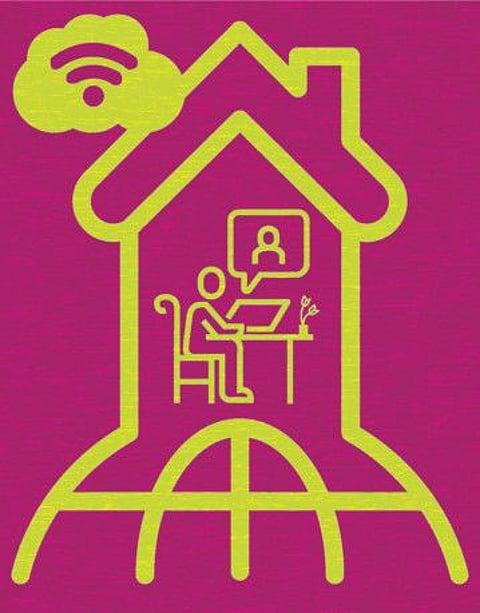Tapping opportunities in a ‘remote’ workplace universe
This will require faster adoption rates for enablers such as 5G and AI

The coronavirus is presenting massive challenges to the global economy, not least because millions around the world may be in voluntary or enforced quarantine for weeks or months to come. Indeed, Google made its Dublin office to work from home as a precautionary measure. Coinbase and Twitter also passed similar policies for their global workforce, instructing employees who were showing any flu-like symptoms to stay at home.
Even during challenging times such as now, the ultimate focus is on maintaining resilience and digital readiness. One of the best ways to achieve this is through synergy with digital connectivity and smart technologies, which can enhance activities like collaboration and online meetings.
In this sense, this present crisis is accelerating plans that forward-thinking companies were already exploring. This includes enhanced options for interactive and immersive collaborative environments to boost productivity and focus.
In the UAE, schools have already put remote learning procedures in place. And it’s probably advisable for companies to plan for this scenario.
But with many organisations baffled on how to ensure productive remote work sessions, let’s look at how best to deal with this challenging scenario.
An ‘immersive’ work space
As the coronavirus sounds alarms everywhere, this revolutionary technology of immersive remote working promotes safety, while also not compromising on work quality. Whereas improvised “working from home” sessions rapidly turn into boredom and loneliness, these disruptive technologies positively impact without disrupting the company itself.
An alternative digital workplace introduces non-traditional practices and environments aimed at improving performance while reducing overheads.
The 5G enabler
A big factor enabling this transformation is the 5G revolution, which is just around the corner. Faster data speeds, high-speed remote work and intelligent connectivity are some of the numerous benefits that the 5G upgrade will provide. To show just how disruptive and transformative impact 5G can have, consider that Huawei deployed its 5G network in the newly constructed hospital in Wuhan, China.
The result was a seamless development and deployment, enabling the health care practitioners to access guaranteed high-speed internet. The importance of this to data collection, and its role in containing the outbreak, cannot be overstated.
Build up AI
The roll out of 5G networks will also allow artificial intelligence (AI) to be fully exploited. Many organisations feared the onset of AI would mark a steep decline in the required workforce. However, a 2018 report by Forbes suggests that it will create 58 million new jobs by 2022, which will lead to further advances.
This virtuous circle will positively impact the economy while introducing tools — which, returning to the theme of this piece, could spread awareness about diseases faster than the infections spread themselves.
This why the Institute of Environmental Management and Sustainability (IEMS Academy) and Munfarid are collaborating to implement an immersive “remote” work platform to help enterprises maintain productivity and performance during emergencies. The objective is to foster a highly interactive and unified virtual experience enabling efficient remote work.
The platform is easy to use, requiring minimal training for employees. Moreover, the presence of maximum parameters and a cross-platform functionality across computer and smartphones are other noteworthy factors. Additionally, it provides collaboration and group tasks to foster a team working and persevering spirit throughout an organisation.
They are seeking third-party help to deal with this unexpected situation because they share a common objective — to develop a streamlined process allowing them to continue work while promoting employee safety and productivity.
Remote learning
In China, 200 million students have been studying online to stay safe from the coronavirus, and others around the world can be expected to follow. As 5G and AI improve, Immersive technology will only accelerate in its usefulness. This will be crucial in terms of education.
For example, life-sized virtual avatar pictures of students foster a feeling of being in the same room, while simulation-based training enhances understanding and application of theoretical concepts in the real world. Immersive classrooms will soon feature a highly immersive learning environment where students are fully engaged with their peers and the teacher.
With these developments, immersive education is predicted to become a $700 million (Dh2.57 billion) industry by 2025, with 93 per cent of teachers “excited” about harnessing XR for teaching. The several instances of immersive education include game-based learning, virtual field trips, skills training, and now tele-education, just to name a few.
Another major impact of remote learning is that it enables experts to connect from all around the world, meaning students living far from universities have equal access to a comprehensive education.
To further this work in our region, we have rolled out an immersive training platform to empower educators and employees by maintaining continuity. Using this platform, teachers will host presentations and classes for students worldwide.
We do this because, as Lorelle VanFossen, co-founder of Educators in VR, says, “AR/VR technologies immerse learners into new perspectives that defy barriers of time, geography and even languages. From job interviewing to training to even dissecting the Covid-19, we are embracing virtual technologies to steadily revolutionise the world.”
In the words of the Steve Jobs, if we strive to maintain an innovative mindset and keep searching for opportunities while facing every challenge, the future is going to be a bright one. Consequently, even epidemics will not hinder us from progressing and adding value every day.
The lesson is clear: remote learning and work environments will become vital tools, even as the present crisis passes.
— Dr Sana Farid is Head of Learning & Development at Munfarid Global. Sami Handley is Director — Institute of Environmental Management and Sustainability Academy (IEMS), a subsidiary of Bee’ah.







